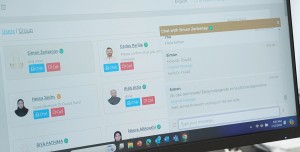
A Glimpse into the Future: Maximizing Employee Performance with AI and Deep Learning
Imagine a world where everyone works less and achieves more. In this transformative world, artificial intelligence (AI) manages your employees, helping them plan their day, enhance their performance, and communicate effortlessly in their native languages. This is not a distant dream but a reality we are on the brink of realizing.
The Role of AI in Employee Management
AI has the potential to revolutionize the way we manage our workforce. Traditional methods of employee management often involve manual scheduling, performance tracking, and communication, which can be time-consuming and prone to human error. AI can automate these tasks, allowing for more efficient and effective management. By analyzing vast amounts of data, AI can identify patterns and trends that might go unnoticed by human managers, providing valuable insights into employee performance and productivity.
For instance, AI can create personalized schedules for employees based on their past performance and preferences, ensuring they are working during their most productive hours. It can also monitor their performance in real-time, providing instant feedback and suggestions for improvement. This not only helps employees perform better but also frees up managers to focus on more strategic tasks.
Enhancing Communication through AI
One of the biggest challenges in a diverse workforce is communication. Employees may speak different languages, and miscommunications can lead to decreased productivity and morale. AI can bridge this gap by communicating with each employee in their native language, ensuring that instructions and feedback are clearly understood. This fosters a more inclusive and efficient work environment, where everyone can perform to the best of their abilities without language barriers.
Boosting Performance with Deep Learning
Deep learning, a subset of AI, takes performance enhancement a step further. By leveraging neural networks that mimic the human brain, deep learning can analyze complex datasets and make predictions with remarkable accuracy. This can be applied to various aspects of employee performance, from identifying skill gaps to predicting future performance trends.
For example, deep learning algorithms can analyze an employee's work habits and suggest personalized training programs to address their weaknesses. They can also predict which employees are at risk of burnout and suggest interventions to prevent it. By providing these insights, deep learning helps create a more supportive and proactive work environment.
Joining Forces for a Better Future
We are on the cusp of a new era in employee management, and we need visionary minds and early adopters to help us turn this vision into reality. By funding research projects focused on enhancing employee performance using AI and deep learning, we can unlock new levels of productivity and job satisfaction. Together, we can shape the future of work, where everyone works less but achieves more.
Join us on this exciting journey and be a part of the revolution in employee management. Let's create a world where AI not only manages our workforce but also empowers them to reach their full potential.
